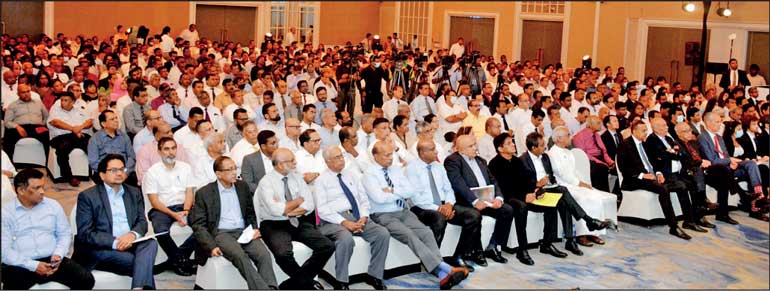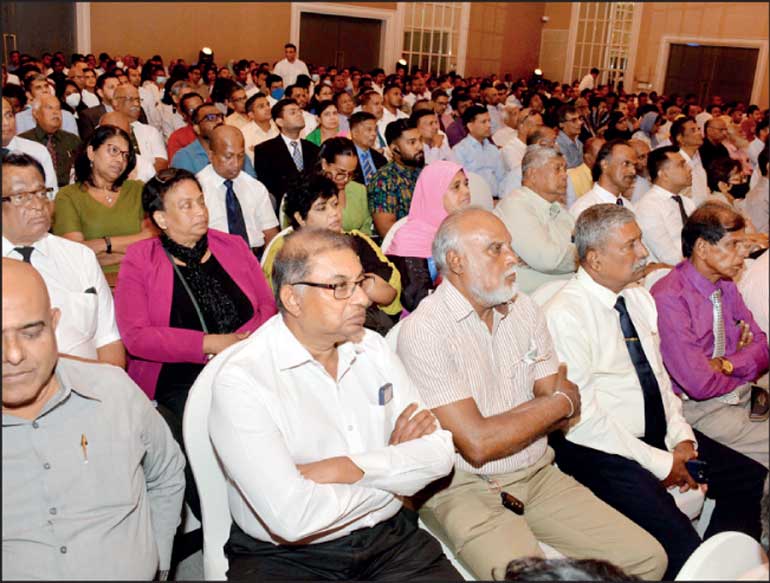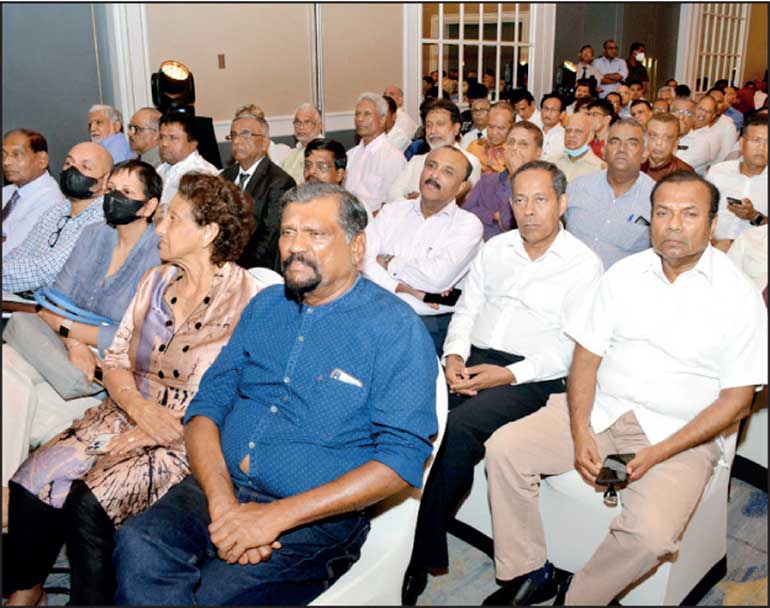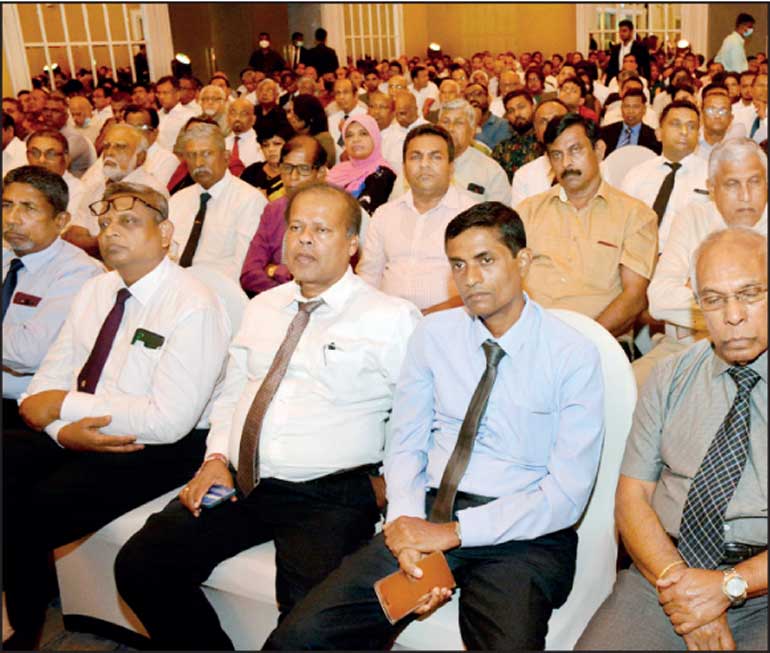Tuesday Feb 17, 2026
Tuesday Feb 17, 2026
Saturday, 18 February 2023 00:11 - - {{hitsCtrl.values.hits}}
Samagi Jana Balavegaya MP Eran Wickramaratne earlier this week unveiled an 11-point blueprint for the economic development of the country under its future government.
Wickramaratne, who is a member of SJB’s Centre for Economic Policy, unfolded the correct direction for the economy to take off within a few years of assuming office. Following are excerpts from his presentation at the SJB Economic Summit.
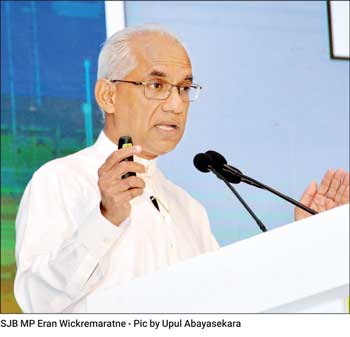
One of the things we will do immediately is make the CBSL independent. We know what happened with printing of money and inflation and the consequences of them. The Monetary Policy of the CBSL will be independent from the Fiscal Policy of the Treasury.
Already a law was drawn in 2019. The then Secretary to Treasury Dr. R.H.S. Samaratunge, CBSL Governor Dr. Indrajith Cooomaraswamy, Dr. Nandalal Weerasinge, Minister of Finance at that time Mangala Samaraweera and myself as the State Minister of Finance and other officials were involved in it. I am calling upon the present to bring this piece of legislation even before we come into office, otherwise it will be the first legislation we will enact.
Bribery and corruption
If we are going to build this country, we must have special attention. Bribery and corruption must be stopped.
Politicians like us, high-level officials must publicise our assets and liabilities. I beg you, you don’t have to wait for the law to come. As a private member, I have submitted a bill to Parliament regarding disclosure of assets and liabilities, and I am asking the Government to make that bill a law.
Special attention will be made on anti-corruption measures as it is a panacea for all ill in governance. The country cannot be changed only by law but by example of the leaders.
We urge the Government to bring the law which has already been submitted as a private members bill to publicise assets and liability declarations of politicians and senior officials.
There is no need to wait for the draft, I request President Ranil Wickremesinghe; there is no need for a law to exist. Make your declaration of assets and liabilities public.
There are two other former Presidents in Parliament, Mahinda Rajapaksa and Maithripala Sirisena, and I request them also to make their assets declarations public. This is an exemplary work that could be set forthwith by the rulers. Countries don’t change only by law-making, on the contrary, countries change by examples of leaders. Therefore, I called upon present and former presidents who are sitting in Parliament to go public with their asset declarations which will compel MPs such as myself and high officials in this country to be accountable to the public.
|
Secondly: Make the CIABOC independent. Now it is not independent. When a theft is reported, people are tracked down and police officers are appointed by the Government to investigate it. As soon as the government changes, those officials are transferred out of it. It completely disrupts the investigations. This is the type of anti-corruption system this country has. So the law to make the commission independent is a must.
The third point is: The STAR Program – The Stolen Assets Recovery Program, a program of the United Nations. We will bring a law to implement this program. According to that law, even if such stolen resources are hidden in Sri Lanka or in a foreign country, they could be traced and brought back to the country.
The fourth point related to bribery corruption is: I am a former state finance minister. For example, today I am a minister, tomorrow I will get involved in stealing. Today the Attorney General’s Department is my counsel, tomorrow the Attorney General should file a case against me. We need to get rid of this system. A conflict of interest is evident here. That is why we demand that there should be an independent prosecutor’s office in this country.
If we put an end to bribery and corruption, others will be fixed automatically. I don’t have to tell you as businessmen in an environment where bribes have to be paid from the bottom to top. Therefore, to move our country forward, we must change it and we will change it. Those were some measures we intent to take on anti-corruption.
The other thing we intend to do is to create a unified revenue collection authority.
This is very important. Businessmen do pay taxes. Around 75% or more of Sri Lanka’s revenue comes from three main institutions, namely Inland Revenue Department, Sri Lanka Customs Department, and Excise Dept. I hope none of you accuse me or the late Mangala Samaraweera of stealing a rupee or a dollar, even while we were in office. But the level of corruption in those departments did not go down. Therefore, we can’t rely on individuals, we have to do systemic changes. That is why we are going to put in place a Unified Revenue Collection Authority.
As a businessman when you import goods you go to your bank and open an LC and you have to get it cleared you go to Customs. I don’t need to tell the rest of the story. Customs only become the clearing hub. Excise and Inland Revenue similarly, you can use technology and these are not new ideas, other countries have done these things. Assessment is done in one place, payment is made centrally interactions with officials become minimal. Instructions go to the Customs, the payment has been centrally made and the goods can be cleared from the Customs.
Creation of a national land bank
Another huge barrier you face when you are in business is, basically getting some land to set up a factory, industry or even an office. I am a person who came from your side (private sector) to this side (public sector) and I can share my view on this area of activity of obtaining land for a multi-modal transport hub. I had to get involved with the UDA, CGR, CTB, Municipal Council, and the state authorities just to get the land sorted out and it took nearly two years.
The President the other day said a National Land Council will be set up and a national land policy will be adopted. What I ask is to do it quickly rather than passing time. We are talking beyond a Council and we will create a National Land Bank. This is one of the huge obstacles the businesses in our country face. That is why we want to make sure that we go in this direction.
Fuel and energy security
The other issue you are currently facing is the fuel and energy issues. No easy solution; and payment cannot be made as there is an immediate dollar shortage in the country. A few months ago MP Harshana Rajakaruna and I were at the COP – 27 meeting in Egypt where the President was in attendance at the meeting of Leaders of Countries meeting on Energy and on the Environment. We were there as Members of Parliament with other members of parliament of South Asian countries. One of the things we don’t openly talk about is, we have the huge potential of sustainable energy; our policy is to open up a system. Sri Lanka’s biggest hurdle is that we have been closed in our borders and we need to open it. Bigger issue is we have closed our minds and we have to open our minds and think out of the box.
Therefore, this potential can’t be tapped unless we have foreign investments and we heard our political parties saying that foreign investment will not be welcomed in the energy sector. What kind of trap is that? We are never going to do it with our savings because we know about our debt problem. Therefore we have to open it up for foreign investment. I can’t understand their logic. What are we talking about here? Solar energy, wind energy, we are selling the resources. Therefore we have to open up. We have so much potential. Harshana and I had discussions with India, Nepal, Bangladesh and Bhutan. They have bilateral arrangements. Sri Lanka’s needs can be met by more than that, we could even become an exporter of energy; therefore, we need to move in that direction.
Legal reforms
The other pressing problem faced by the businesses is the legal issues. All kinds of disputes, agreements, you want them enforced, etc. etc. I must confess upfront I am not a lawyer, not a legal person, but there is a lot that has been written. Fair and equal treatment is absolutely important. Business also needs guarantees against appropriations as when I was in Parliament first in 2010-2015, it was awful to see what the then government did that day.
The private sector lost confidence. The Government might use Parliament to basically expropriate transactions and assets that have already been given. This nonsense must be stopped. We have constitutional guarantees. But despite the constitutional guarantees the unlawful expropriation predominates concerns of the private sector. The State has the right to regulate, but not even to unlawfully or indirectly expropriate. Fair treatment must be ensured and we will work on it.
|
We need to be seen as a reliable country where the local and the foreign businesses actually can deal with us. This needs a lot of consultations on how we are going to do this. We need to make Sri Lanka a Centre for Arbitration seat in the region to move in this direction.
Centralised approvals and a BOI for local businesses
Why only the concept for foreign investments. Why haven’t we thought about it? Several years ago when I was a banker I was asked, how do I develop ICT. I was not an ICT man but I was a banker. I was asked to take over the ICT. I went and looked at it. There were more drivers and clerks than ICT people there. I came up with a recommendation to shut it down and that is how the ICTA was started. Some of these organisations will have to be radical. I will give an indication that we will do the reform stating a new BOI for local businesses whether it is a company registration if people apply, if the registration is given within the specific time and if it is not given, companies are automatically allowed to proceed. We have to be radical in our thinking if we want this country to really go ahead. These are not new but other countries have done these things. Therefore these things can be done.
Foreign Direct Investments
Our foreign policy is an independent state. I like the old language that was used by Madam Sirimavo Bandaranaike. A non-aligned country taking into consideration the security concerns of our neighbour India, the closed proximity we have, we have to work intelligently. But we are an independent State. That is our foreign policy. In this foreign policy we don’t care where investment comes from. The Rule of Law will be paramount. We have to have an empowered BOI. Export will be given primacy. Value addition to that high end services, basically high tech manufacturing institutions will be relooked at.
State Owned Enterprises
MP Dr. Harsha De Silva gave the staggering statistics of State Owned Enterprises which is absolutely ridiculous. I remember a former Prime Minister called me one day and said he wants to put the SriLankan Airline under me. I said sir wait a minute. I don’t want it. He looked very puzzled. He asked, why? I said, Sir there is no point giving me the things that cannot be overturned by me. Everybody looked shocked. We have to stop fooling ourselves. Unless we are honest in this dialogue we are not going to get anywhere.
SOEs need to be reformed. I am going to tell you what our policies are. Our philosophy is limited government ownership in strategic areas. There are strategic areas such as finance, food and energy sectors. But you know how to do things better. I don’t think the Government needs to be involved. You are the entrepreneur, you know the market you know better, therefore, you should be doing. Now the number of SOEs has risen from 105 to 250 in numbers. And the losses have risen to more than a trillion rupees. We believe in Public Private Partnership. We looked at various models of PPP.
We see now the institutions put under different ministries and the ministers setting them through their secretaries, as chief executives giving instructions to commercial enterprises. We want to move from that. We want to take the people who know what to do to be in-charge of them. That is why that structure is important and the businesses can lead that structure. One more thing is bankruptcy can also be avoided. Therefore we need a law on bankruptcy and reorganising bankruptcy. Preliminary work was done and the AGs Dept. made a key role in it.
The diaspora
We need to take this country to the next level. It is not going to be easy. I think we have a 2- 3 year struggle on our hands. Stabilisation first, as Dr. Harsha said. If I use the word Diaspora here, this word has been redefined with Sri Lanka’s conflict. That is why I purposely use the word overseas Sri Lankans. Sri Lankans living overseas are not a liability; they are one of the biggest assets this country has. Their educational level is very high, they have the technology and the foreign currency, so many huge advantages and we want to welcome them here. If they decide to have dual citizenship they are given it. Their 2nd Generation born abroad will be given permanent residencies and we will open our doors for them and their investment. Why should we close the door for the biggest assets we have?
Education for all
The geographic location of Sri Lanka is a great advantage. We are the hub for the Indian sub-continent in education and human resources. Airport, ports logistics are available. The SJB policy is that every child in this country must have access to higher education. Though education is a public good the supplier need not necessarily be the Government. Private sector too can be a supplier. Two private sector medical colleges opened by the private sector previously were shut down due to protest by left wing political parties who are against private sector contribution towards education.
The responsibility of the Government is regulation of providing education. We want to preserve our societies and families. We don’t want our youngsters going abroad looking for greener pastures or shelter in other countries. This not only about economy but values culture, family society, etc.
